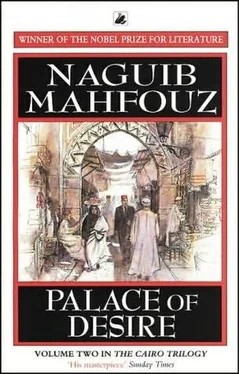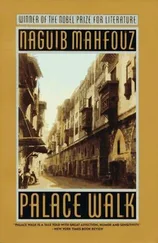Naguib Mahfouz - Palace of Desire
Здесь есть возможность читать онлайн «Naguib Mahfouz - Palace of Desire» весь текст электронной книги совершенно бесплатно (целиком полную версию без сокращений). В некоторых случаях можно слушать аудио, скачать через торрент в формате fb2 и присутствует краткое содержание. Жанр: Современная проза, на английском языке. Описание произведения, (предисловие) а так же отзывы посетителей доступны на портале библиотеки ЛибКат.
- Название:Palace of Desire
- Автор:
- Жанр:
- Год:неизвестен
- ISBN:нет данных
- Рейтинг книги:5 / 5. Голосов: 1
-
Избранное:Добавить в избранное
- Отзывы:
-
Ваша оценка:
- 100
- 1
- 2
- 3
- 4
- 5
Palace of Desire: краткое содержание, описание и аннотация
Предлагаем к чтению аннотацию, описание, краткое содержание или предисловие (зависит от того, что написал сам автор книги «Palace of Desire»). Если вы не нашли необходимую информацию о книге — напишите в комментариях, мы постараемся отыскать её.
, his rebellious children struggle to move beyond his domination, as the world around them opens to the currents of modernity and political and domestic turmoil brought by the 1920s.
Palace of Desire — читать онлайн бесплатно полную книгу (весь текст) целиком
Ниже представлен текст книги, разбитый по страницам. Система сохранения места последней прочитанной страницы, позволяет с удобством читать онлайн бесплатно книгу «Palace of Desire», без необходимости каждый раз заново искать на чём Вы остановились. Поставьте закладку, и сможете в любой момент перейти на страницу, на которой закончили чтение.
Интервал:
Закладка:
Khadija stealthily scrutinized Maryam. Although she had not thought of her former friend for years, news of her marriage to Yasin had inspired a flood of bitter comments. She had reminded Aisha about the incident with the Englishman, wondering aloud what could have blinded and deafened Yasin. Yet Khadija's emotional commitment to her family was so intense that it took precedence over everything else and prevented her from criticizing Maryam within earshot of members of the Shawkat family. Not even Khadija's husband was exempted. She cautioned her mother: "Whether we like it or not, Maryam is going to become part of our family". There was nothing strange in this attitude, for Khadija, even after giving birth to Abd al-Muni'm Shawkat and Ahmad Shawkat, still considered the Shawkats strangers, to a certain degree.
The marriage clerk arrived early in the evening, and the wedding contract was drawn up. Cool drinks flavored with fruit syrup were passed around and a single whooping trill of joy resounded. Yasin received their congratulations and good wishes. The bride was summoned to meet her "senior master," al-Sayyid Ahmad, and the family of her new husband. Escorted by her mother, Khadija, and Aisha, she kissed her father-in-law's hand and shook those of the others. Then al-Sayyid Ahmad presented her with the wedding gift, a set of gold bracelets studded with small diamonds and emeralds. The family gathering lasted a long time, with the guests starting to leave, one after the other, at about nine. Then the carriage arrived to take the couple to Yasin's house in Palace of Desire Alley, where he had prepared the third floor to receive his bride. Everyone thought that, for better or for worse, the curtain had fallen on Yasin's second marriage.
But two weeks after this wedding the home of the late Mr. Muhammad Ridwan witnessed another nuptial party, one considered truly bizarre by the residents of al-Sayyid Ahmad's home, of Sugar Street, of Palace of Desire Alley, and of the whole Palace Walk neighborhood. Without any prior warning, people learned to their total amazement that Bahija was marrying Bayumi, who sold fruit drinks. Everyone was stunned by this. It seemed they were realizing for the first time that Bayumi's shop stood at the head of the alley where the Ridwan residence was located and that it lay directly beneath one of the venerable latticed balconies of the house. Confronted by this fact, they could only wonder. And people had every reason to be amazed, for the bride was the widow of a man known during his lifetime for his goodness and piety an d she was considered one of the respectable ladies of the district, even though she was fond of personal adornment. And she was fifty. The bridegroom was a common fellow who wore unpretentious ankle-length shirts and sold carob- and tamarind-flavored drinks in a small shop. He was only forty. He had also been married for twenty years and had fathered nine children. All these factors provoked gossip. Without any reserve whatsoever people waded into the subject of the events that must have preceded the wedding but which had passed undetected by anyone. When and how did these things happen? How did they develop to the point of culminating in matrimony? Which of the two parties had initiated the relationship and which had accepted the invitation?
Uncle Hasanayn, the barber, whose establishment was on the other side of the street, next to the ancient building housing the public cistern, reported that he had frequently seen Mrs. Bahija standing in front of Bayumi's stall, consuming a carob drink. Perhaps they had exchanged a few words then, but, being a kindly man, the barber had never suspected anything. Asking God's forgiveness, Abu Sari', who sold roasted snacks from a shop that closed later than other ones, said he had occasionally noticed men slipping into her house by night but had not known Bayumi was one of them. Darwish, who sold cooked beans, had some things to say, as did al-Fuli, the milkman. Although they pretended to pity the man with all those children and to criticize him bitterly for being so stupid as to marry a woman old enough to be his mother, they were secretly envious of his luck and resented his ascent from their class by means of this unorthodox ploy. Following those comments there was a great deal of talk about the extent of his expected inheritance from the house and a possible treasure trove ofjewelry.
The households of al-Sayyid Ahmad, of Sugar Street, and of Palace of Desire Alley were severely shaken. "What a scandal!" everyone exclaimed. Al-Sayyid Ahmad was so angry that members of his immediate family were too terrified to speak to him for several days running. From that time on, Bayumi the drinks vendor would surely have a right to consider al-Sayyid Ahmad his relative. "Curses on Yasin and his lusts!" Bayumi the drinks vendor had become his "uncle," and everyone's nose had been rubbed in the dirt.
When the information reached Khadija, she shouted, "What awful news!" Then she asked Aisha, "Who could ever fault Mother after this? Her heart is never wrong."
Yasin swore to his father that the event had taken place without his knowledge or his wife's. It had made his wife sadder than anyone could possibly imagine. But what could she do?
The scandal did not stop there, for the moment Bayumi's first wife heard the news, she went berserk and stormed out of her home like a lunatic, pushing her children in front of her. She swooped down on Bayumi in his store, and a fierce battle broke out between them as words, hands, feet, shrieks, and screams were employed within the sight and hearing of their children, who began to howl and implore people at hand and passersby to help. Soon a crowd had collected in front of the store — pedestrians, shop owners, women, and children. When they separated the couple and forced the woman back into the street, she came to rest under Bahija's balcony. Her dress was ripped, her wrap in shreds, her hair disheveled, and her nose bloody. She reared her head back to look up at the shuttered windows before unleashing a tongue like a whip with poisoned, weighted ends.
Worse still, when she left her post there, she headed for al-Sayyid Ahmad's store, because he was the father-in-law of her husband's new stepdaughter. She begged him tearfully and ora-torically to use his influence to convince her husband to mend his sinful ways. Although seething with rage and chagrin at his plight, al-Sayyid Ahmad heard her out. Then he delicately tried to make her understand, so far as he was able, that this whole affair was beyond the scope of his influence, contrary to her expectations. He kept at it until he persuaded her to leave his store. He was furious but, even so, thought long and hard about Bahija's motives for this strange marriage, especially since he was certain it would not have been hard for her to find a way to gratify any desire she might have felt for Bayumi the drinks vendor without exposing herself and her family to the disturbing consequences of marriage. Why had she committed this folly, paying no attention to the man's wife and children and wantonly disregarding the feelings of her daughter and her daughter's new family, as if she had gone insane? Was it not a gloomy feeling of growing old that had made her seek refuge in marriage? Indeed she was sacrificing many of her possessions in her pursuit of the happiness that fleeting youth had once secured for her. He brooded over this idea sorrowfully and despondently. He remembered his own humiliation at the hands of Zanuba the lute player. She had refused him so much as an affectionate glance until he had set her up in the houseboat. That humiliation had shattered his self-confidence and had made him, despite his apparent serenity, frown back at time, since it had begun to frown at him.
In any event, Bahija did not have long to enjoy her marriage. By the end of the third week she was complaining of a sore on her leg. When she had a medical examination she was diagnosed as being diabetic and taken to Qasr al-Ayni Hospital. Reports of the gravity of her condition were heard for several days. Then the appointed hour overtook her.
Читать дальшеИнтервал:
Закладка:
Похожие книги на «Palace of Desire»
Представляем Вашему вниманию похожие книги на «Palace of Desire» списком для выбора. Мы отобрали схожую по названию и смыслу литературу в надежде предоставить читателям больше вариантов отыскать новые, интересные, ещё непрочитанные произведения.
Обсуждение, отзывы о книге «Palace of Desire» и просто собственные мнения читателей. Оставьте ваши комментарии, напишите, что Вы думаете о произведении, его смысле или главных героях. Укажите что конкретно понравилось, а что нет, и почему Вы так считаете.












